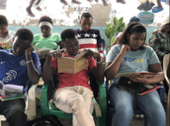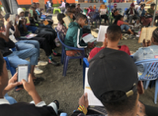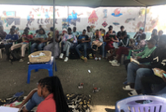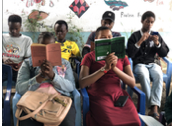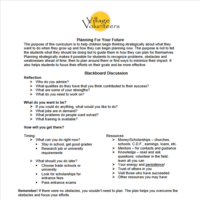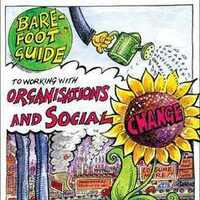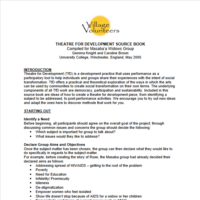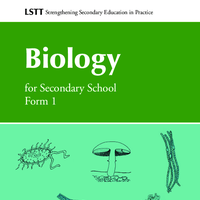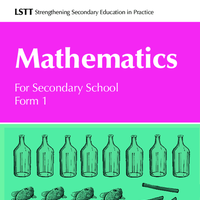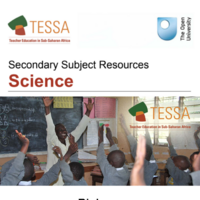Dashboard
Taarifa
Free books
Dashboard
Taarifa
Free books
8 must read free eBooks for teachers
This publication is for anyone who influences how children experience education in our schools.
It reaches out to school administrators, teachers, policymakers and activists who recognise the
need to improve how we deliver education. It aims to inform and inspire those individuals who
recognise schools as our places of hope, our investment in the future and our commitment to
children today. In short, this publication speaks to everyone who has a stake in creating better
schools.
This publication is a discussion of ideas and not a how-to manual. It presents issues and
interventions requiring urgent attention as we design the way forward. As an interested and
influential stakeholder, your decisions could affect how our schools evolve in the coming years.
Therefore, this publication presents perspectives and information that may inform your thoughts
and choices.
Our hope is that, as you read this publication, you will ask deeper questions about how we
deliver education and how it could be different. By investing your influence, resources and
imagination in realising some of the following ideas, you could profoundly impact the lives of
numerous children—as well as the lives touched by the decisions these children will make when
they become our future leaders.
...
Part of the Good School Toolkit
...
Youth Counseling and Development
Young people benefit from the guidance of counseling and development in order to conquer stereotypes, believe in possibility, take concrete action to achieve their goals and provide leadership in community projects. The following resources encourage students to explore their potential and provide them with leadership skills.
...
Planning for Your Future
The purpose of this curriculum is to help children begin thinking strategically about what they want to do when they grow up and how they can begin planning now. Planning strategically makes it possible for students to recognize problems, obstacles and weaknesses ahead of time, then to plan around them or find ways to minimize their impact. It also helps students to focus their efforts on their goals and be more effective.
Leadership-Activity-Workshop
This workshop is based on the premise that each student will face a variety of leadership challenges in life. The way in which these challenges are met, whether as a formal leader or a member of a team, can have a significant impact on the individual and the community at large..
Leadership Activity Learning Workshop
This workshop is designed to foster leadership skills through teamwork for students ages twelve to fifteen. Because the discussion is a main priority, the teacher will be in the classroom as a guide: leading students to learn from one another by asking questions about the words they have chosen.
Principles of Leadership
Read excerpts from The Tao of Leadership that inspire thought, discussion and reflection among students.
Team Building Activities
Team building exercises are a great way to develop trust and friendship within groups. Whether you are trying to help strangers get to know each other, entertain a group, or simply have a good time, these activities are sure to help everyone get to know each other a little better and have some fun.
Values and Self Esteem Exercise
A value is something very personal, and it is not considered right or wrong. Reading statements aloud, students offer opinions and practice respectfully listening to and discussing the opinions of others.
Sexual Assault and Grief Recover– This program is designed to help women who have suffered trauma and grief in their lives. The program is specifically targeted toward women who have been victimized sexually through trafficking, incest, rape, or molestation. The content provided can be used across a broad age range and cultural background. Facilitation to ensure understanding and age appropriateness is suggested.
...
"This is a practical, do-it-yourself guide for leaders and facilitators wanting to help organisations to function and to develop in more healthy, human and effective ways as they strive to make their contributions to a more humane society. It has been developed by the Barefoot Collective. The guide, with its supporting website, includes tried and tested concepts, approaches, stories and activities. It's purpose is to help stimulate and enrich the practice of anyone supporting organisations and social movements in their challenges of working, learning, growing and changing to meet the needs of our complex world. Although it is aimed at leaders and facilitators of civil society organisations, we hope it will be useful to anyone interested in fostering healthy human organisation in any sphere of life"--Barefoot Collective website.
...
Performing Arts employs interactive theater to communicate important social messages. This type of engagement stresses the equal input of all parties involved while encompassing strong cultural traditions of teaching and disseminating important information throughout communities.
AIDS Education in Africa Using Traditional Performance
For two decades, forum theater has been used as a popular means of community development in West Africa and Kenya to bring healthcare and other social development messages to rural people.This two-way communication permits audience members to act out and hopefully internalize concepts such as healthcare, nutrition, sex and AIDS education, and family planning.
Improvisational Exercises for Theater
Exercises such as Telephone, The Scream, and Mirror, encourage free flowing interaction and expression through body language and interpretation of that expression to better act out theatrical messages to the community.
Theatre for Development Source Book
Included in this source book are ideas of how to create a theatre for development piece, from identifying a subject to be addressed, to post-performance activities. We encourage you to try out new ideas and adapt the ones here to discover methods that work for you.
Wangari Maathai, An Inspiration – Curriculum
Learn and share the story of Wangari Maathai, a girl born in Nyeri, Kenya in 1940 whose brother persuaded her parents to send her to school. She was the first woman from East or Central Africa to earn a PhD and, while department head of Veterinary Anatomy in 1976, she started The Green Belt Movement in 1977, when women from rural areas and urban centers were empowered by planting trees. Wangari Maatha with a long history of activism for empowerment, received the Nobel Peace Prize in 2004.
Wangari Maathai Play – A Tree Grows in Kenya
A play telling the inspirational story of Wangari Maathai, a brave, educated Kenyan woman who won the Nobel Peace Prize in 2004 for her tireless work empowering women and supporting the environment. Written by Amanda Pressner, Holly Corbett, Jennifer Baggett and Irene Scher
Youth Health Education – Theatre Guide
This guide to producing your own play was created to empower youth to establish a community theatre group. Community theatre groups can serve as an educational forum for social and health issues while giving youth a way to express their core challenges. As a volunteer, your role is of a cheerleader and a facilitator; a person who keeps the momentum going through enthusiasm and encouragement. Remember that the main body of material and ideas must come from the participating community and to keep programs sustained well beyond your volunteer service, it’s imperative to help to solidify group leadership by consensus.
...
Nyerere’s essay, “Elimu ya Kujitegemea,” begins by defining the goal of education: To pass on wisdom and knowledge from one generation to the next in order to prepare young people to understand the environment around them and take their place in society. Nyerere then identifies three problems with the colonial education system that Tanzania inherited from the British. As you read these, ask yourself: do you see these three problems in the educational system of today in your country? First, the education system benefited only a tiny portion of students who could get lucrative jobs in the colonial bureaucracy, while teaching most children little or nothing of practical use. Second, the colonial schools raised children far from the farm, the family, and real life. Third, the education system gave students the mistaken impression that the only valuable knowledge is found in books, written by “experts,” and measurable with standardized testing. In the second half of the essay, Nyerere proposes the solution: Education for Self-Reliance. He argues that integrating farming and entrepreneurship into schools will benefit more students, bring families into schools, and open students’ minds to the wisdom that comes from experience.
The education provided must therefore encourage the development in each citizen of three things; an enquiring mind; an ability to learn from what others do, and reject or adapt it to his own needs; and a basic confidence in his own position as a free and equal member of the society, who values others and is valued by them for what he does and not for what he obtains.
...
This Biology text is intended to support Tanzanian students in Form I, who are beginning
to learn subjects in English. When Form I students start learning subjects in English, they
often find that they cannot use the language well enough to learn effectively. Learning in
English is also difficult because everything they know already from primary school was
learnt in Kiswahili.
Language accessible: This means it is written in a simple way, with diagrams that
allow all students in Form I to read it.
Language supportive:This means that the textbook helps students to develop their
English as they learn Biology.
Relevant to learners’ context: Biology is about the living world around us.
Learning Biology is easier and more interesting when it is contextualized.So this
book is filled with examples from learners’ context
The result, we think, is a great book that will be easy for teachers to use, and for students
to learn from. Above all it will show students that learning Biology is a wonderful,
relevant and exciting journey. We hope you enjoy using it with your students as much as
we enjoyed writing it.
...
Author: Juliana B. Mosi, Aisha I. Ghuhiya, Richard Alphonce, Prosper Gabrieli, Flora Mbembe, Kalafunja Osaki, Eliakimu Sane, Dave Bainton, Neil Ingram, Emmanuel Lutashobya, Idd Marumba
Illustrator: Emmanuel Lutashobya, Idd Marumba
...
This textbook supports Tanzanian students in Form I. When Form I students start learning subjects
in English, they often cannot use the language well enough to learn Mathematics effectively. Good
teaching builds on students’ previous learning. For Form 1 students, their previous learning was in
Kiswahili. This book is:
• Language accessible. This means it is written in a simple way, with content communicated
through diagrams and activities.
• Language supportive. This means that the textbook helps students to develop the English that
they need to learn Mathematics. It also means that the book helps Form I students to recall their
mathematical knowledge from primary school and translate this into English.
• Tanzanian. Mathematics is used in Tanzania on a daily basis. Mathematics was developed
by men and women from different parts of the world in response to human needs, to solve
problems and for fun. This book represents the multicultural background of Mathematics and its
use in Tanzania.
We think the result is a great book that will be easy for teachers and students to use. Above all, it
will show students that learning Mathematics can be exciting, fun and useful. We hope you enjoy
using the book as much as we enjoyed writing it.
...
Authors:
Ratera S. Mayar, Tanzania Institute of Education
Makoye J.N. Wangeleja, Tanzania Institute of Education
Angeline M. Barrett, University of Bristol
Peter Kajoro, The Aga Khan University, Institute for Educational Development, East Africa
Jesse Ndabakurane, University of Dodoma
Francis William, University of Dodoma
Illustrator: Idd Marumba
All contents of this book are covered by a Creative Commons Attribution Non-Commercial No
Derivatives 4.0 International licence. They may be reproduced or adapted for non-commercial use
only. Authorship should be attributed to the Language Supportive Teaching and Textbooks in Tanzania
(LSTT).
An electronic copy is available open access and may be downloaded from the LSTT website:
www.lstttanzania.wordpress.com.
...
TESSA (Teacher Education in Sub-Saharan Africa) aims to improve the classroom practices of
primary teachers and secondary science teachers in Africa through the provision of Open Educational
Resources (OERs) to support teachers in developing student-centred, participatory approaches. The
TESSA OERs offer activities for teachers to try out in their classrooms with their students, together
with case studies showing how other teachers have taught the topic, and linked resources to support
teachers in developing their lesson plans and subject knowledge. TESSA OERs have been
collaboratively written by African and international authors to address the curriculum and contexts.
They are available for online and print use (http://www.tessafrica.net). Secondary Science OER are
available in English and have been versioned for Zambia, Kenya, Uganda and Tanzania. There are 15
units. Science teacher educators from Africa and the UK, identified five key pedagogical themes in
science learning: probing children’s understanding, making science practical, making science relevant
and real, creativity and problem solving, and teaching challenging ideas. Each theme is exemplified in
one topic in each of Biology, Chemistry and Physics. Teachers and teacher educators are encouraged
to adapt the activities for other topics within each subject area. We welcome feedback from those who
read and make use of these resources. The Creative Commons License enables users to adapt and
localise the OERs further to meet local needs and contexts.
Contents
Module 1 Biology
● Section 1 Classification and adaptation
● Section 2 Transport
● Section 3 Respiration
● Section 4 Nutrition, conservation and ecology
● Section 5 Cells
Module 2 Chemistry
● Section 1 Elements, compounds and mixtures
● Section 2 Acids, bases and salts
● Section 3 Combustion
● Section 4 Atomic structures, chemical families and the periodic table
● Section 5 States of matter
Module 3 Physics
● Section 1 Properties of matter
● Section 2 Measurement
● Section 3 Pressure and heat transfer
● Section 4 Forces
● Section 5 Electricity and magnetism
...
Kuna vitengo 15 vya Sayansi ya Sekondari vya TESSA ambavyo unaweza kuvipata katika ukurasa huu.
Vimeundwa na washiriki kutoka Ghana, Zambia, Kenya, Tanzania na Uganda.
Tumechagua mada ambazo ni ngumu kwa kufundisha kutokana na mtaala wa Sayansi ya Sekondari ya awali na pia zilizo za kawaida katika nchi zote.
Vitengo vimekusanywa katika makundi matano ya dhamira za ufundishaji, yakionyesha ufundi na tabia ya mwalimu mwenye ufanisi.
Hivi ni:
Kuchunguza kwa makini uelewaji wa wanafunzi
Kuifanya sayansi ya utendaji
Kuifanya sayansi ya ukweli na yenye maana
Kutatua masuala na ubunifu
Kufundisha mawazo yenye changamoto
Kila dhamira hujitokeza kwa mfano wake katika Biolojia, Kemia na Fizikia, na zote huwa jumla ya vitengo 15.
Kama mada unayoifundisha haikuwekwa humu, basi tunatumai kwamba wewe mwenyewe utaweza kuirekibisha mojawapo ya vitengo ili vilingane na hali halisi ya kile unachokihitaji.
Kama ungependelea kuchagua dhamira ya ufundishaji mmoja tu basi itakubidi kupakua sehemu zote za 1 ili kujifunza jinsi ya ‘kuchunguza ufahamu wa watoto’; sehemu ya 2 ili kujifunza jinsi ya ‘kuifanya sayansi ya utendaji’; sehemu ya 3 ili kujifunza jinsi ya ‘kuifanya sayansi ya ukweli na yenye maana’; sehemu ya 4 ni kujifunza jinsi ya ‘kutatua masuala na ubunifu’; na sehemu ya 5 ni kujifunza jinsi ya ‘kufundisha mawazo yenye changamoto’.
Kama rasilimali hizi ni inapatikana kwa Kiingereza utaelekezwa kwa pan-Afrika toleo English
...
